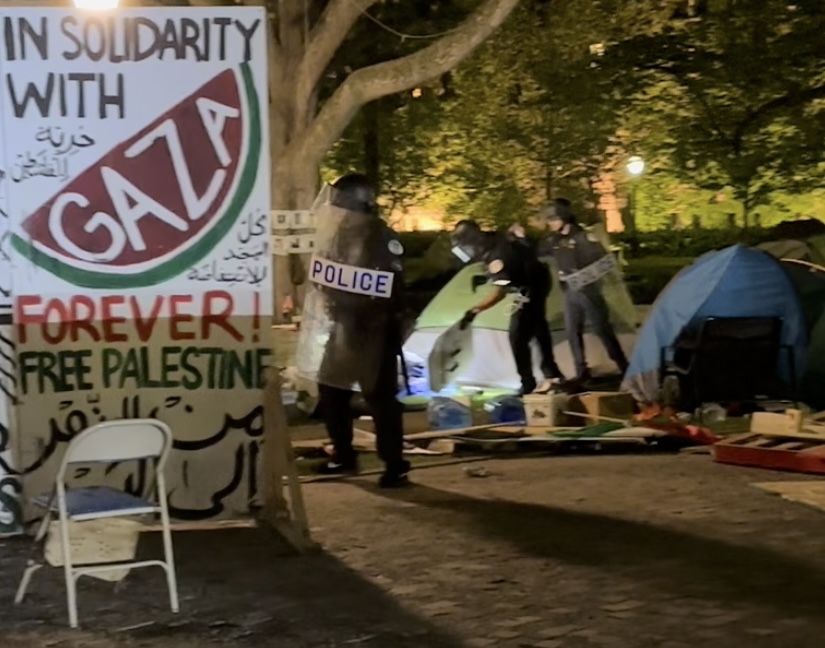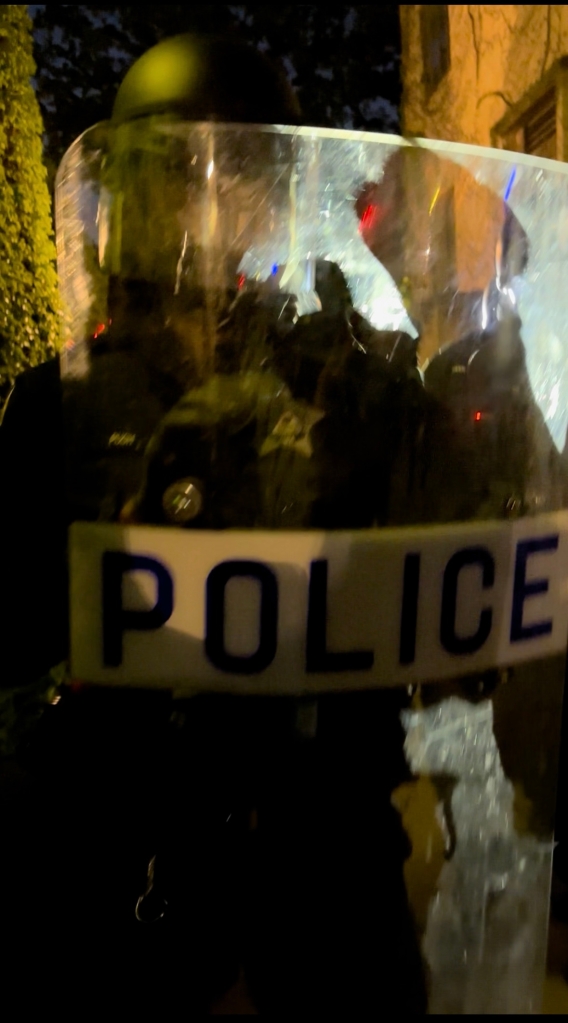Jessica H. Darrow
In the wake of the razing of the encampment on our quad, many of us are asking ourselves about our relationship to the University of Chicago and the university’s relationship to the wider world. The encampment and what it stood for was not a phenomenon unique to our campus, and thus these questions might mirror those asked by other university communities.

Given that the university is a place where truth and knowledge are pursued and scientific inquiry is central to these pursuits, there is a need for risk-taking within the institution. After all, can one create and test hypotheses or address complex questions about meaning if one is unable to risk failure in the pursuit of a breakthrough? The university must prioritize conditions that foster risk-taking. Here is where I enter the discussion. As a professor of social work, it is my job to teach students about the power and purpose of protest and to demonstrate what it means to enact the values of social work, which include a commitment to equity and countering oppression in all its forms. My pedagogy is centrally focused on creating conditions that permit students to take intellectual risks and face serious discomfort as they are unsettled in their pursuit of truth and knowledge. I want students to feel respected, valued, and assured that when they take a risk in their academic exploration they will be supported. To describe these conditions, I use a word that the university abhors; safety. I understand my role within the university to be that of a professor who creates safety and encourages risk-taking. I support our students’ right to protest, and I believe it is our job to ensure they are safe to engage in this form of free expression.
From this grounding, I am trying to understand the university’s role in creating conditions of safety, for whom does it do so, and at whose expense?
The University falsely denies its status as a political actor and claims that silence is neutral. The administration, citing the Kalven Report and the Chicago Principles, did not issue a public statement after the attacks by Hamas in Israel on 7 October. Nor did the university make any public statement in November, condemning Israel for threats of genocide against the Palestinian people in Gaza, despite the UN’s call to the international community to do so. And the university has remained silent in the face of evidence that the grounds for determining genocide have been met. Finally, the administration refuses to acknowledge the fact of “scholasticide” in Gaza. I disagree with the university’s assertion that silence in the face of genocide is a neutral stance.
It is in this context that the UChicago Popular University for Gaza was created as part of our students’ ongoing campaign to hold UChicago accountable as a political entity. The student protest amplifies the reality of genocide in Gaza and demands that UChicago “Disclose, Divest, and Repair.” Meanwhile, students created a community of care, creativity, and commitment within their protest movement. Here I offer a brief ethnographic description of select events at the encampment that have led me to insights about the university’s role in creating conditions of safety, for whom does it do so, and at what expense.
1
They came marching toward the encampment flying American and Israeli flags, chanting “USA!” White Nationalists and Zionists, an unlikely brotherhood. My Faculty for Justice in Palestine colleagues and I have been meeting since November to plan and enact support for our students who stand in solidarity with Gaza. Our goal has been to send the message that students do not face this university alone. On that day our plan was face the White Nationalists directly so that students could maintain their calls for justice without drawing in police action. Our role was to help avoid physical conflict. As the protesters and counterprotesters met face to face with only the faculty between them the student protest line pushed ahead. When a student was knocked to the ground, we faculty stepped forward to de-escalate the now heated confrontation. Whereas the members of the Popular University for Gaza had spent a week developing community, teaching and learning, eating together and making art, the counterprotesters were made up of a rapidly deployed coalition with little cohesion. They were disorganized, chaotic, and unpredictable. It was clear that the situation was likely to combust, and so, with arms locked, the protest retreated as one removing ourselves from the center of the quad. “Disclose, Divest, we will not stop, we will not rest,” the protesters chanted. The line receded to the camp. The Chicago Police and University of Chicago Police (UCPD) stepped into the now empty central quad.
The University did not have a role in creating safety in this altercation. In fact, the violence that could have erupted had dissipated by the time UCPD arrived. It was student protesters and FJP allies who de-escalated this interaction. Students in the encampment had been clear all along with their “No Cop Zone” signs; the encampment did not want a police presence. “We keep us safe,” they kept repeating.
2
On Sunday the administration said they were done talking: negotiations were suspended. What the students are asking for is outside the bounds, they argued. What they want is not possible, they said. Who decides what is possible? we are left to wonder.
The university said they would come, and we were ready. Members of our faculty coalition went to the camp to wait. We were there to get arrested with our students if that is what we needed to do to defend their right to protest. But no raid came. Exhausted and exhilarated, they all tried to sleep.

3
Monday: at midnight the camp will be cleared, we heard. FJP came out in numbers for a second night in a row. Midnight came and went—no raid. 3 a.m. came and went. The students sang and it was festive. The encampment had survived another night. I talked to a UCPD officer on shift. “We are tired,” he said. “Sixteen-hour shift,” he said. “When are they going to sleep so we can have some quiet?” he said. “I know,” I said. “You must be tired,” I said. “I hope we can all go home and sleep in the morning,” I said. My faculty colleagues went home to sleep. The students crawled into the tents. It was quiet. It was peaceful. I walked around the quad. There was a breeze, but it was not cold. It was dark. It was calm. I talked with the student marshal. We stood in the quad, and we wondered aloud about the day.
It was then that the lights swept onto the pavement at the end of the quad. “What is that?” I asked.
“Maintenance crew,” the marshal said as he glanced over his shoulder. And then UCPD were everywhere, yelling. The lights flooded over us. The shouting, the floodlights in my eyes, students running and trying to get out of the way of the boots stomping on their tents and get out from the nylon material as the tents they had been asleep in were ripped out from under them, the stakes coming out of the ground. Students tried to avoid the metal folding chairs that UCPD picked up and threw. As officers ripped the wooden pallets off the barricade that had been meant to protect the camp, and threw them violently across the pavement, the students stepped back. Why was no one hurt? Because students kept enough distance. UCPD did not keep us safe.
It was a violent, brutal, surprise attack that was meant to scare us and destroy the space students had created. The administration quickly took credit for the “safe” destruction of the camp. They deserve none. I phoned and texted my colleagues, asking them to join my efforts to de-escalate, but they could not get to us, they were not allowed onto the quad and we were barricaded in. No one was arrested, Paul Alivisatos has said. UCPD shouted over the megaphone, “you will be arrested.”
It was orderly, there was plenty of time, he has said. It was chaotic and loud, and terrifying. There was no time.
We were bullied. We were terrorized by UCPD in riot gear. That is, black helmets with face shields, black batons and body shields, men screaming at us and threatening us with arrest. They used the fear of harm to make us move. They had guns on their belts, zip ties in hand. This is what the University of Chicago did to our students, to the free expression of ideas they do not like, in a format they find unacceptable. The university values free expression. But only in the forum. Only on their terms.
Even as I take seriously my role in creating a context of safety for the purpose of intellectual risk-taking (and sometimes protest), it is clear to me that the university does not share my commitment. When faced with student protest and demands that UChicago end political engagements related to the genocide of Palestinians, the administration deploys UCPD, upending safety.
Some of us were surprised that the university would call its private police force on students, staff, and faculty—after all, aren’t we the ones UCPD is there to protect? Then we must ask, protect from whom? The presumption that our campus needs police protection is racist and elitist and comes at the expense of the safety of our community neighbors. What we need is for our university to create a context of intellectual safety for the purpose of risk-taking in pursuit of knowledge, acknowledge its role as a political actor and divest from genocidal institutions, be good neighbors in the wider Southside community, and disband UCPD.
Jessica H. Darrow is an associate instructional professor in the Crown Family School of Social Work, Policy, and Practice at the University of Chicago


Pingback: Palestine, the University of Chicago, and the Politics of Campus Protests | In the Moment
Pingback: Palestine and the Politics of Imagination | In the Moment
Pingback: The Chicago Principles Tactics | In the Moment